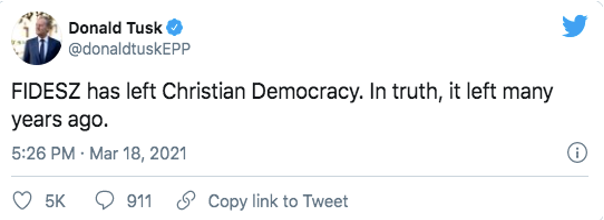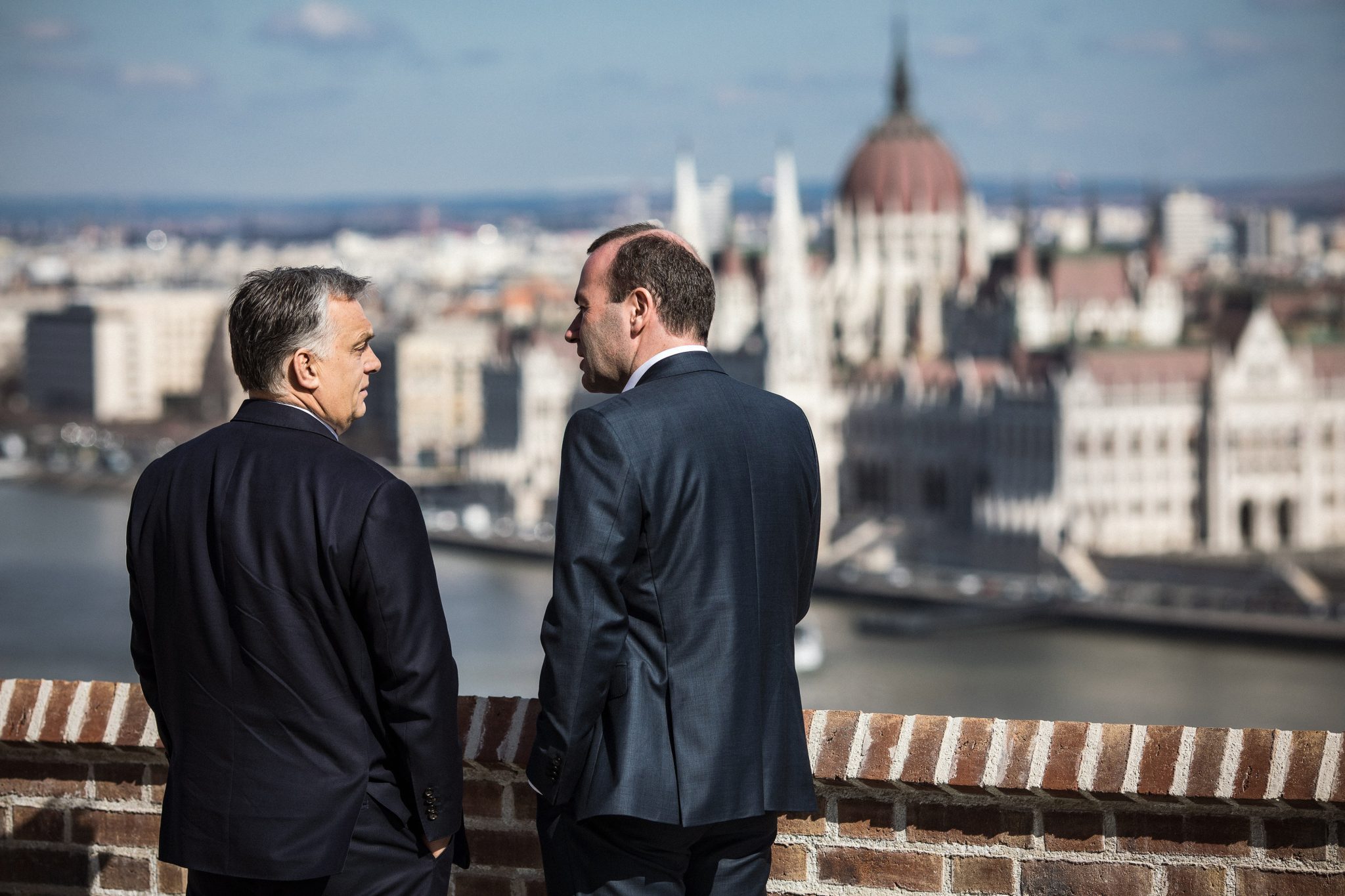By Edoardo Mauro and Gabriela Passatore
The center-right Hungarian political party Fidész has left the European People’s Party after twenty-one years of partnership. The end of the relationship was announced on Twitter by Katalin Novak, vice-president of Fidész, on March 18 of 2021. The message was simple and did not bring any details about their decision to leave the EPP. However, its decision was made right after the EPP voted for a rule change, leaving no doubt about the reason behind Fidész’s withdrawal. With Fidesz leaving the European People’s Party the future is uncertain. The EPP has lost 12 seats in the European Parliament and the Hungarian Party is left with many uncertainties.
The new internal rule, which was passed with 84% of the votes, facilitates the EPP to suspend or dismiss the membership of any of its members, overcoming those in place since 2013. With that, it would be much easier to expel Fidész.In response to EPP actions, Viktor Orbán denounced the changes as “a hostile move against Fidesz and our voters”, putting forward Fidész’s official resignation letter, which was later confirmed by the European People’s Party.
For Orbán this might be an anti-democratic act, but for many, it is a long-awaited change. Petri Sarvamaa, Finnish MEP and Vice-Chair of EPP expressed on Twitter his relief on the resignation of Fidész by saying: “It’s over”.
In 2018, the European Parliament has voted in favor to initiate Article 7 of the EU Treaty proceedings against Hungary, under the argument that Hungary’s law posed a real threat to the EU’s fundamental principles. The European Council has yet, to this day, to act regarding this matter. In 2019, Fidesz was suspended from the EPP after a long list of concerns regarding human rights in Hungary. Finally, since 2020 Orbán has been using the pandemic crisis to enforce even more restrictions by declaring the state of emergency, putting at risk what is left of the Hungarian democracy.
Given that Fidesz’s anti-democratic pulsion has become more and more evident through the years, it was just a matter of time until the EPP took some measures to stop, or at least try, Orbán’s actions against European Democracy and values. It is yet unclear if Fidesz’s anti-democratic actions will decrease with the end of this partnership, but for sure Fidesz’s withdrawal came at the right time, and it has been well accepted by many.
The Austrian EPP member, Othmar Kara welcomed the outcome by declaring that: “The FIDESZ exit from the @EPP is a logical step and overdue. Orbán mentally quit his politics years ago. The attempt to induce him to return to the bottom of our values had failed”. Donald Tusk, former president of the European Council and now president of the EPP, has also shown support of Fidesz’s withdrawal on Twitter by declaring: “FIDESZ has left Christian Democracy. In truth, it left many years ago.”. His post has been liked by five thousand people, showing their support for EPP’s change.
 The declarations of the other EPP leader Manfred Weber draw a cumbersome picture of the Hungarian ally. Once in good relations with Hungary, Weber changed its tone after the Sargentini report was delivered to the European Parliament in September 2018. Weber affirmed he expected Hungary to respect Europe’s common values, but he avoided being too vocal on the issue. To win the EPP leadership for the 2019 elections he needed support from Fidész, but he also needed to condemn an uncomfortable ally. When Manfred Weber became the Spitzenkandidat for the European People’s Party, Orbán surprisingly endorsed his candidacy. Would Weber secure right-wing voters, thus losing moderate ones, or would he appeal to moderate conservatives? When the EPP suspended Fidész in March 2019, Manfred Weber tweeted “They have to rebuild trust”. In April, the EPP candidate declared on the German television that he would forgo the seat of President of the European Commission if that were achieved thanks to the votes of Fidész. EPP’s discontent with the Hungarian ally became more evident than ever. In December 2020, Orban said in his response “Samizdat No.5” that it was evident that Weber blamed Hungary for his failure to become president of the European Commission. He also disavowed Manfred Weber, who “has joined the elite club of the Left”. In March 2021, on his part, Weber told Euronews that it was Fidész’s responsibility if it was left isolated in the EPP. Furthermore, in the end “the substance was finally too problematic”.
The declarations of the other EPP leader Manfred Weber draw a cumbersome picture of the Hungarian ally. Once in good relations with Hungary, Weber changed its tone after the Sargentini report was delivered to the European Parliament in September 2018. Weber affirmed he expected Hungary to respect Europe’s common values, but he avoided being too vocal on the issue. To win the EPP leadership for the 2019 elections he needed support from Fidész, but he also needed to condemn an uncomfortable ally. When Manfred Weber became the Spitzenkandidat for the European People’s Party, Orbán surprisingly endorsed his candidacy. Would Weber secure right-wing voters, thus losing moderate ones, or would he appeal to moderate conservatives? When the EPP suspended Fidész in March 2019, Manfred Weber tweeted “They have to rebuild trust”. In April, the EPP candidate declared on the German television that he would forgo the seat of President of the European Commission if that were achieved thanks to the votes of Fidész. EPP’s discontent with the Hungarian ally became more evident than ever. In December 2020, Orban said in his response “Samizdat No.5” that it was evident that Weber blamed Hungary for his failure to become president of the European Commission. He also disavowed Manfred Weber, who “has joined the elite club of the Left”. In March 2021, on his part, Weber told Euronews that it was Fidész’s responsibility if it was left isolated in the EPP. Furthermore, in the end “the substance was finally too problematic”.

A hot topic in the European Parliament is about what Fidész will do next. Fidész counted just for 12 seats, but it was a number that is nice to have. Now the party is among the Non-inscrits, which means that Fidész is confined to irrelevance. Talks started in mid-March between Orbán, Salvini (Lega – League), and Morawiecki (PiS – Right and Justice) to create a new nationalist political group in the EP. The new group would count 64 seats. While it would make the voices of the three parties stand out, it might fragment the unity of Eurosceptic parties. The situation would be most ugly for the European Conservatives and Reformists, home of the Italian rival of the League, Fratelli d’Italia. The group would go down to 38 seats from the current number of 62. On the opposite, the situation would be splendid for the League, now a member of Identity and Democracy. In just one move, the party would decouple from the embarrassing partners of RN and AfD.
Yet, the situation is still unraveling. Considering that the League is now involved in a grand coalition in Italy, his declarations on the matter are cautious. Being too bold would not be wise. On the side of the EPP, the departure of Fidész does not impair the ability of the relative-majority group to pass votes. However, it becomes more evident that the European People’s Party needs the support of a broader political spectrum. Exactly what Orbán repudiated.

